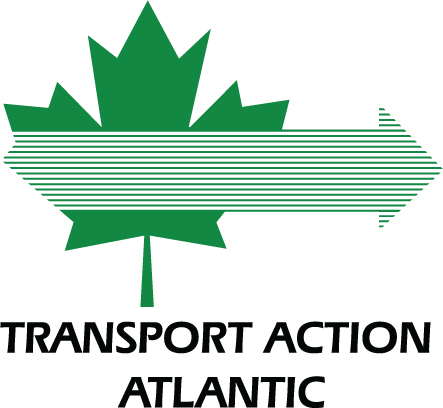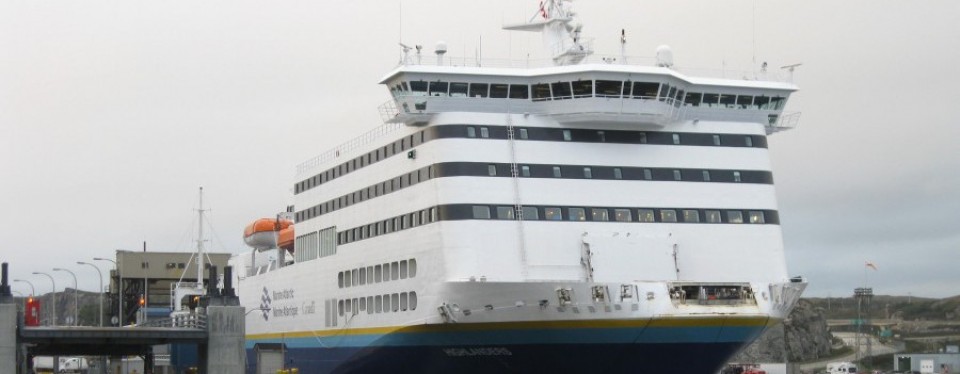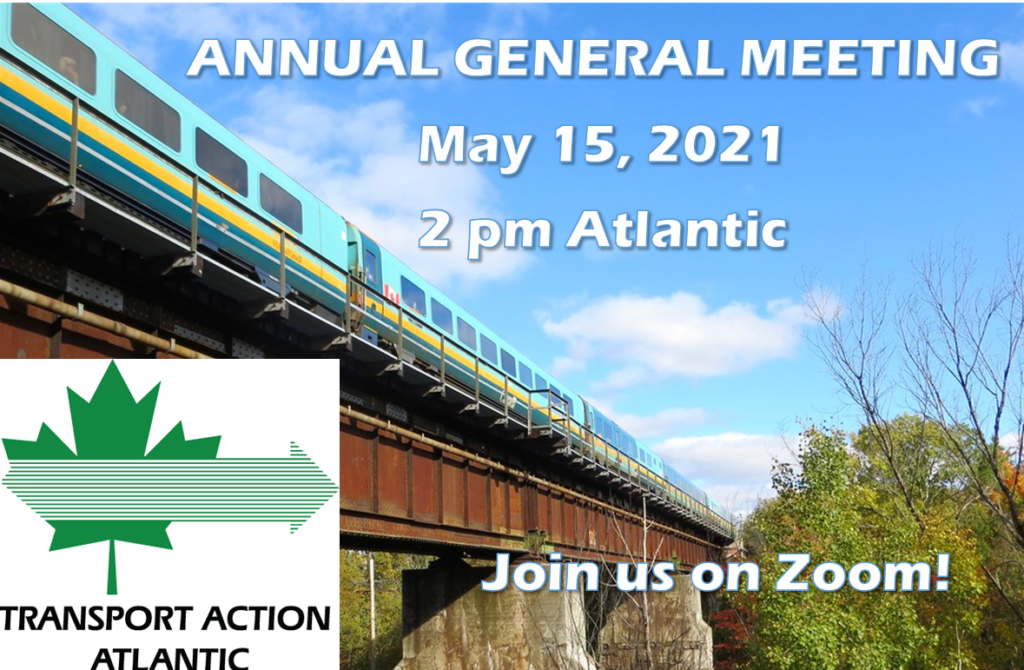Welcome to the June edition of Atlantic Transport News!
Here’s a look at what you’ll find in this edition:
- Decision makers need passion and commitment, says motorcoach industry leader
- NL motorcoach operator may be forced to shut down
- Little good news for region at VIA public meeting
- Two VIA stations in northern NB face demolition
- Lively discussion at TAA’s virtual AGM
- Saint John and Halifax divided on US rail merger
- Uncertainty surrounds Atlantic Bubble
DECISION MAKERS NEED PASSION AND COMMITMENT SAYS MOTORCOACH INDUSTRY LEADER

There’s an evident lack of passion and commitment about the public transportation needs of Canadians among key government decision makers, according to the Prince Edward Island entrepreneur who rescued line-haul motorcoach service in the Maritimes from the brink of oblivion nine years ago. Mike Cassidy was guest speaker at the virtual annual general meeting of Transport Action Canada held on May 27.
In an hour-long “fireside chat” with TAC members, the Maritime Bus owner expressed his frustration with all the politics inherent in the struggle to re-establish a coast-to-coast network of motorcoach operators to transport both people and parcels between communities that are badly underserved by public transportation. Mr. Cassidy is one of several independent bus company operators from across the country that are working together in an effort to jointly assemble a coherent national system from the wreckage left in the wake of Greyhound’s abandonment of its Canadian operations.
Although the technology exists to establish an integrated system for reservations and package interlining, the support of governments – especially the Government of Canada – is essential to make it happen, he insists. And there’s little indication of any appetite or sense of urgency at the top. While some individual politicians, including some Liberal MPs, have been supportive, there’s no passion for public transportation among those with the authority to make decisions and who ultimately control the purse-strings.
There is indication that the federal government’s new Rural Transit Fund is only available for non-profit organizations, which could be another nail in the coffin for companies like Maritime Bus. Senior officials are evidently not prepared to acknowledge that commercial motorcoach operators are in dire straits and in need of a helping hand because of the pandemic. His company was modestly profitable prior to 2020, Mr. Cassidy says, and he’s built his business on passion and a commitment to the industry. He’s proud of the fact that he was able to succeed where big corporations like the multi-national transportation giant Keolis could not. And during the COVID crisis buses have continued to carry people to their destinations when trains and flights have been suspended. Now should have been the time to invest in motorcoach, but it is not happening. Even Greyhound’s demise has not been enough to ignite the passion.
“I just wish the Canadian government believed in Canadian bus companies,” he concluded, adding that a modest investment of $30 million over ten years would be sufficient to restart and maintain the coast-to-coast motorcoach system.
-Ted Bartlett
NL MOTORCOACH OPERATOR MAY BE FORCED TO SHUT DOWN

The owner and general manager of the motorcoach company that operates a 900 km daily service on the Trans-Canada Highway across Newfoundland’s cross-island bus line says ridership has hit rock bottom because of COVID-19. Without some form of financial relief from government, Jason Roberts says the mounting losses may force his operation to shut down as early as this month.
“It’s very, very disheartening,” he told CBC News, adding that he’s been asking both the federal and provincial governments for months to extend a helping hand that would enable his company to weather the pandemic storm – but to no avail.
There’s plenty of precedent for taxpayer assistance to for-profit companies during the pandemic, Mr. Roberts said, pointing to massive federal bailouts for air carriers and interim funding offered for bus operations by provincial governments in the Maritimes.
“Everyone’s trying to stay put as much they can so, I don’t expect them to travel, but the ones who got to travel, they still need a means to go,” he said, adding that if he has to suspend DRL’s daily services, it might not make sense to start them up again a few months down the line. “It’s not going to be easy to pick it up and put it back on the road, and make it something that’s going to be very flourishing again, so it’s very important for us to keep going,” he said. DRL acquired the trans-island bus service from newly-privatized Canadian National in 1997. The so-called “Roadcruiser Service” had replaced the CN passenger train in 1969, and federal government responsibility to ensure continuing service at fares consistent with passenger rail elsewhere in Canada was acknowledged in the 1988 federal-provincial Memorandum of Understanding that provided for final abandonment of the Newfoundland Railway.
LITTLE GOOD NEWS FOR REGION AT VIA PUBLIC MEETING

For the second year in a row, VIA’s Annual Public Meeting was an entirely virtual affair, featuring a pre-recorded video update from CEO Cynthia Garneau and other senior VIA management. The 22-minute video, which can be found on both YouTube and the VIA Rail website, offered little by way of specific details, but the overall message was clear – 2020 was an extremely unusual and difficult year for VIA, and the railway isn’t out of the woods yet. Recently released annual and quarterly reports tell much the same story, with ridership plummeting through 2020 as the combination of rail blockades and the pandemic restricted travel and curtailed most of VIA’s services. Still, with the first of the new trains for the Corridor nearly ready to arrive for testing and vaccination roll-outs moving at full speed across the country, there are some reasons to have optimism about things improving in the near future.
At the time of writing, the Ocean is currently suspended through the end of July 2021. However, with vaccinations continuing at a rapid pace and the various Atlantic provinces unveiling reopening plans that could see less restricted travel from the rest of the country by late July or early August, there is actually some hope that this could really be one of if not the last extensions of the now nearly 16-month service suspension. At TAA’s recent AGM, Philippe Cannon, VIA Rail’s director of public affairs and government relations, explained that the corporation is continuing consultation with representatives from both the New Brunswick and Nova Scotia governments to discuss when conditions will allow the resumption of service. He did acknowledge, however, that the train won’t be back until border restrictions have been lifted and all parties involved are satisfied that it’s safe and feasible to do so.
In addition to the public meeting itself, VIA provided a Q&A document addressing common questions that were submitted in advance of the meeting. As is often the case, the answers were not as thorough as one might hope, nor do they provide much clarification beyond what was already known. For the Ocean, there’s a reiteration of the plan for a bidirectional train using a mix of Renaissance and HEP equipment, but beyond that the answers offer no new details. Responses about whether any sort of dome car will be in the consist to replace the Park car offer only a look at what may be the case while the pandemic is still a concern (and while the Ocean is still unlikely to be running!), and no forward-looking plan. There is also still no commitment to improve service frequency or track conditions, and no further details about what plans may be in place to replace the rapidly deteriorating long distance train fleet. https://corpo.viarail.ca/sites/default/files/media/pdf/speeches/2021%20Annual%20Public%20Meeting_VIA%20Rail_Q&A_EN.pdf
At the very least, both the comments in the public meeting itself and the Q&A document reiterated a commitment to restore service on the Ocean – albeit at the inadequate tri-weekly schedule in place since 2012 – as soon as conditions allow. One answer in the Q&A document even states that “The Ocean is a pillar of VIA Rail’s service offering providing essential intercity travel as well as attracting tourists from around the world. VIA Rail remains committed to serving communities in Eastern Canada, and to a full recovery of this route when conditions will allow it”. Now if only VIA would actually treat the Ocean as though it were the “pillar” that they claim it to be, by making the service offering more attractive and useful to the communities it serves!
-Tim Hayman
TWO VIA STATIONS IN NORTHERN NB FACE DEMOLITION

Two unstaffed VIA Rail stations in northern New Brunswick are about to be demolished, according to informed sources in the area. The “request stops” for the Ocean at Charlo and Jacquet River, two small communities located between Bathurst and Campbellton, have been unstaffed for many years. The sources are telling TAA that there’s been no apparent interest from either community in taking over the facilities, as has been done with some other stations in the Maritimes and elsewhere where there wasn’t sufficient traffic to warrant the continued presence of VIA employees.
The buildings have reportedly been deteriorating over time, particularly at the Jacquet River location where the roof is said to be in need of major repairs if the building were to be once again made available as a shelter for rail travellers. TAA was not able to confirm reports that tenders had been called by VIA for demolition of the buildings, and at this writing there had been no response to questions directed to the company. It is not known if the Ocean will continue to stop on request at Jacquet River and Charlo when it returns to service post-pandemic.
LIVELY DISCUSSION AT TAA’S VIRTUAL ANNUAL MEETING
Perhaps the current federal government really does believe that Canada ends at Quebec City – at least as far as political influence is concerned. That not-so-encouraging thought was just one of many that emerged during Transport Action Atlantic’s annual general meeting held on May 15. For 2021 the AGM was once again a virtual affair, using the Zoom platform. The now-familiar technology, which admittedly lacks the social benefit of face-to-face contact, does have the advantage of enabling participation by members for whom distance might make attending an in-person meeting difficult or impossible. The online turnout was quite impressive, with representation from all four Atlantic provinces – and beyond.
University of New Brunswick economist Herb Emery told the meeting that the Trudeau Government appears to be firmly focused on the vote-rich territory of Canada’s six largest urban areas. That makes it extremely challenging for smaller cities to get attention, and to reap a fair share of infrastructure funding.

TAA’s old familiar refrain that “Canada doesn’t end at Quebec City” would seem to be well directed, Dr. Emery suggested. He senses it will be an uphill struggle to persuade the federal cabinet to invest in “building back better” through climate-friendly projects such as passenger rail and public transit outside the areas of the country that they evidently have identified as priorities.
Meanwhile, the transportation implications of “The Big Reset” – Newfoundland and Labrador’s recently unveiled economic recovery report – were reviewed by TAA board member Tom Beckett. He told the meeting that there are many aspects or opportunities missing or overlooked in the document, noting that the work was directed from the UK by ex-pat Newfoundlander Dame Moya Greene, former head of both Canada Post Corporation and Britain’s Royal Mail, who is known as a strong supporter of privatizing public services.
Included in the report are a suggested 1.5 cents per litre tax on gasoline, a recommendation to support electric car adoption (without the recognition of a need to replace the gasoline tax as electric vehicles become a larger portion of the fleet), an acknowledgement the provincial ferry service is very expensive, and an obvious statement that the provincial road system is quite large and costly to maintain.
One missed opportunity, according to Tom Beckett, is the new ro-ro ferry service between NL and the French enclave of St. Pierre off the island’s south coast, which now can accommodate all vehicles up to and including transport trucks. St. Pierre itself has a trans-Atlantic marine service subsidized by France which has plenty of room on the return crossing.
“This places the EU directly accessible to Newfoundland through Fortune. Live Fortune Bay lobster in Paris, Newfoundland beverage alcohol on the Champs-Élysées, and other products routed to new EU markets. More money in the pockets of Newfoundlanders,” he said. “St. Pierre also has seasonal service by Air France. This provides a spectacular opportunity to draw tourists into the province. Perhaps a strategic private sector partnership orchestrated by government but funded entirely with private sector capital?”
The Big Reset makes no mention of the need to get the 65% cost recovery on Marine Atlantic rates reduced substantially to the benefit of the entire economy, or the significant savings on school busing that could be attained by providing Metrobus passes and service within St. John’s and Mount Pearl. Tom also suggested that significant revenue could be obtained from placing a small toll of perhaps a dollar a trip on the four-lane divided highways in the northeast Avalon which have free alternatives – a concept similar to the 407 north of Toronto. Finally, there is no suggestion of incorporation of transportation elements into the provincial pandemic recovery.
SAINT JOHN AND HALIFAX DIVIDED ON US RAIL MERGER
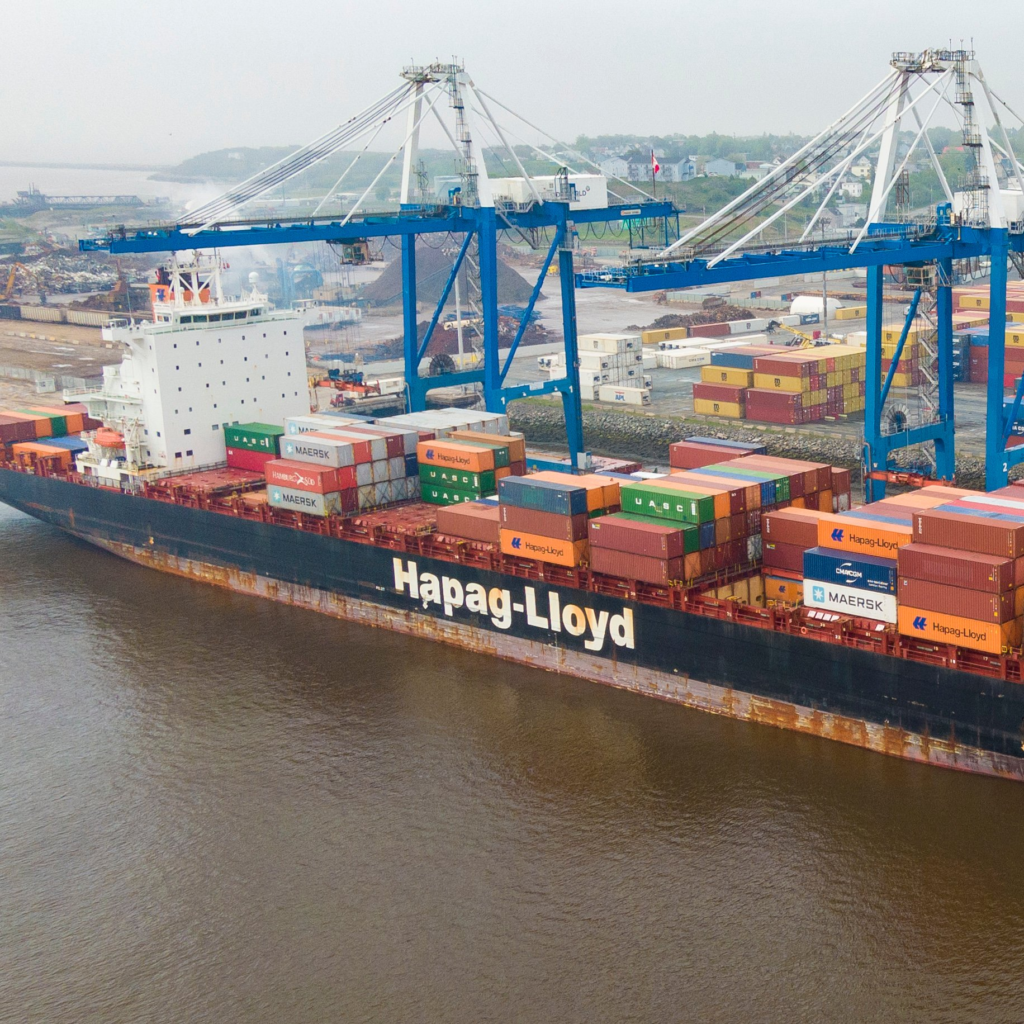
A multi-billion dollar battle between Canada’s two major railways over a potential merger with smaller US carrier Kansas City Southern has put Atlantic Canada’s two largest seaports in opposing corners. The high-stakes conflict began when Canadian Pacific and KCS made their merger plans known earlier this year. It was too much for arch-rival Canadian National, which promptly countered with a higher bid that was ultimately accepted by the KCS board of directors. CP declined to sweeten its offer, expressing confidence that the CN proposal would not get the approval of US regulators.
Kansas City Southern serves multiple destinations in Mexico, so the merged railway would link all three countries in the North American free trade pact – a substantial competitive advantage.
Some three decades after selling its “short line” to the Maritimes, CP is now once again involved with the Port of Saint John in a big way through its connection with the JD Irving-owned shortline NB Southern. Although CN also runs to Saint John, it is the only railway serving Halifax. As might be expected, both the Nova Scotia government and the Halifax Port Authority are strongly supporting the CN bid. Premier Iain Rankin has written a letter backing CN’s proposal.
“Any growth in the CN network is a growth opportunity for the Port of Halifax,” said port CEO Capt. Allan Gray in an interview with CBC News. “We’re reaching deeper into the U.S. market. So this is a whole new market space for the Port of Halifax.”
Meanwhile, New Brunswick Premier Blaine Higgs has written to US regulators, urging them to reject the CN bid.
UNCERTAINTY SURROUNDS ATLANTIC BUBBLE
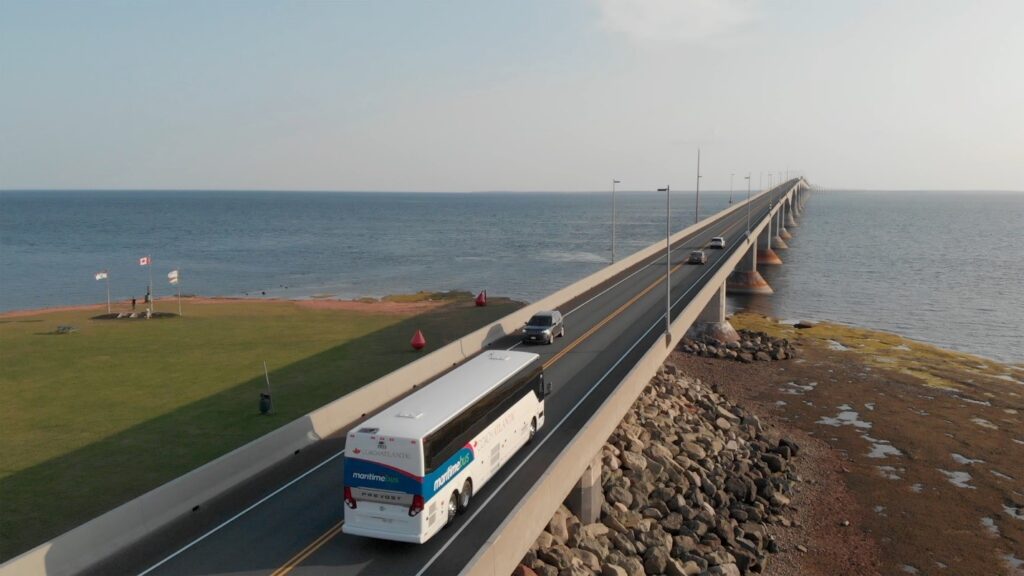
With summer in the air, an Atlantic Bubble that would permit unrestricted travel among the four provinces is far from a done deal. Originally planned to launch on April 19, the agreement that was so successful in 2020 has now been postponed twice. The sudden and severe third wave of COVID-19 in Nova Scotia truly upset the apple cart, and blossom time was devoid of out-of-province visitors. In fact, for most of May even travel between adjacent communities in the fabled Annapolis Valley or elsewhere in NS was prohibited.
As the calendar turned into June, the overall case count in the region had improved considerably, but each provincial government seemed intent on a different path for return to normalcy. On June 1, NS was reporting 369 active cases – down by nearly half from the beginning of May. It had peaked at well over 1500 at mid-month. NL reported 90 cases – up from 33 on May 1 – resulting from outbreaks in the central and western regions of the province. NB’s count was essentially unchanged at 142, while PEI had only four cases, down from 12 a month earlier.
In 2020 a remarkable spirit of co-operation led to a highly-successful four-province agreement that attracted national attention. By allowing freedom of movement at a time when COVID case counts were relatively low throughout the region, many tourism operators were able to salvage at least something from the summer and fall seasons. Despite a few bumps in the road, Atlantic Canada is still in a relatively good situation, but some alarming occurrences since late last year have apparently made officials and politicians nervous. In addition, there are two new premiers who are still feeling their way through difficult times. In Nova Scotia, Iain Rankin is being quite cautious about opening his province to visitors, while Premier Andrew Furey seems to have yielded somewhat to tourism industry advocates who want to see NL opened to the rest of Canada this summer. However, barring a change of heart, it would appear that visitors from Ontario won’t be able to travel through Nova Scotia to get to Newfoundland. There’s also an evident lack of reciprocity between New Brunswick and PEI. And the situation seems to get ever more complicated as the peak travel season approaches. The earliest suggested date for a 2021 Atlantic Bubble is now July 1 – but that’s certainly not carved in stone.
All this has serious implications for transportation companies, as well as tourism operators. There have already been postponements of announced start-ups and restarts of air services around the region, motorcoach services in the Maritimes remain on a four-days-per-week schedule and the line-haul operator in Newfoundland says it may have to shut down entirely by the end of June if some financial relief isn’t forthcoming. Meanwhile, VIA Rail has confirmed that its return to service in the region will not happen until travel restrictions between Quebec and New Brunswick are lifted.
